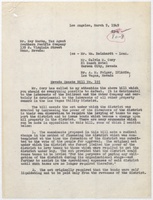Search the Special Collections and Archives Portal
Search Results
The Collection of Newspaper Clippings on Thomas Hanley
Identifier
Abstract
The Collection of Newspaper Clippings on Thomas Hanley is comprised of photocopied newspaper articles from the
Archival Collection
White Cross Drug Store Scrapbook
Identifier
Abstract
The White Cross Drug Store Scrapbook (1950-1964) contains photographs, employee training materials, newspaper clippings, advertisements, displays, and some historical narrative and press release material on the history and mission of the White Cross Drug Store. It also includes advertising ephemera and brochures on cosmetic products and perfumes of the early 1950s.
Archival Collection
Monty Brandt Photograph Collection
Identifier
Abstract
The Monty Brandt Photograph Collection consists of black-and-white photographic prints of the White Cross Drug Store on Fremont Street in Las Vegas, Nevada from 1924 and 1955. Images include views of Fremont Street, as well as interior and exterior views of the White Cross Drug Store.
Archival Collection
Elizabeth Casper Photograph Collection
Identifier
Abstract
The Elizabeth Casper Photograph Collection, approximately 1947 to 1960, contains photographic prints and slides that document the childhood of artist and schoolteacher, Elizabeth Casper, and her family life in Las Vegas, Nevada. Included are images of Casper and her family as well as the Helldorado parade, civic celebrations, churches, a nursery school, and casinos in Las Vegas.
Archival Collection
Ariana Saunders (The Corporation for Supportive Housing) oral history interview conducted by Kelliann Beavers and Elia Del Carmen Solano-Patricio: transcript
Date
Archival Collection
Description
From the Lincy Institute "Perspectives from the COVID-19 Pandemic" Oral History Project (MS-01178) -- Community organization interviews file.
Text
Southern Nevada Historical Society Photograph Collection on Basic Magnesium, Inc.
Identifier
Abstract
The Southern Nevada Historical Society Photograph Collection on Basic Magnesium, Inc. contains photographs of the construction of Basic Magnesium Inc.'s plants and buildings from 1941 to 1942. The photographs primarily depict aerial views of the plant site and various buildings, including the administration building, tent camp, chlorination buildings, electrolysis facilities, electrical distribution systems, and warehouses. The photographs also depict Lake Mead and the early buildings in Henderson, Nevada.
Archival Collection

Transcript of interview with Elinor Horden by Valerie Fujii, February 13, 1930
Date
Archival Collection
Description
On February 13th, 1980, collector Valerie Fujii interviewed dancer, Elinor Horden, (born May 21st, 1930 in Ohio) at the University of Nevada, Las Vegas. This interview covers local entertainment in the 1950s and the social and environmental changes that have occurred in Las Vegas, Nevada.
Text

Lisa Hank oral history interview: transcript
Date
Archival Collection
Description
Oral history interview with Lisa Hank conducted by Barbara Tabach on May 31, 2019 for the Remembering 1 October Oral History Project.
Lisa discusses her move to Las Vegas in the early 1990s from California for a job with the Las Vegas Metropolitan Police Department, and her current position as head of the Police Employee Assistance Program (PEAP). Lisa talks about the night of October 1 and the aftermath of the shooting, both in her work and personal life. She is the wife of Charles Hank III, police officer and another interviewee for the Remembering 1 October Oral History Project.
Subjects discussed include: well-being in aftermath of 1 October; PEAP preparation; healing.
Text

Letter from E. E. Bennett (Los Angeles) to Ray Marks (Reno) regarding Nevada Senate Bill 155, March 9, 1949
Date
Archival Collection
Description
Letter from Bennett calling attention to Nevada Senate Bill No. 155. Senate Bill 155 gives the Las Vegas Valley Water District power in levying taxes and issuing bonds in ways contrary to its original act. According to Bennett, it would create an unfair tax burden on the Los Angeles & Salt Lake Railroad Company and should be defeated. Senate Bill 155 is referenced below.
Text
Audio clip from interview with Lovee duBoef Arum by Barbara Tabach, November 1, 2016
Date
Archival Collection
Description
Part of an interview with Lovee duBoef Arum on November 1, 2016. In this clip, Arum discusses her childhood, family life, and what brought her to Las Vegas.
Sound
